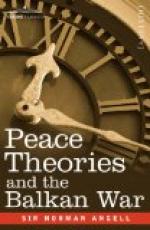to improve, hardly even to govern, but simply
to conquer.... The Turk makes nothing at all;
he takes whatever he can get, as plunder or pillage.
He lives in the houses which he finds, or which
he orders to be built for him. In unfavourable
circumstances he is a marauder. In favourable,
a Grand Seigneur who thinks it his right
to enjoy with grace and dignity all that the
world can hold, but who will not lower himself by
engaging in art, literature, trade or manufacture.
Why should he, when there are other people to
do these things for him. Indeed, it may
be said that he takes from others even his religion,
clothes, language, customs; there is hardly anything
which is Turkish and not borrowed. The religion
is Arabic; the language half Arabic and Persian;
the literature almost entirely imitative; the art
Persian or Byzantine; the costumes, in the Upper Classes
and Army mostly European. There is nothing
characteristic in manufacture or commerce, except
an aversion to such pursuits. In fact, all
occupations, except agriculture and military service
are distasteful to the true Osmanli. He
is not much of a merchant. He may keep a
stall in a bazaar, but his operations are rarely undertaken
on a scale which merits the name of commerce or finance.
It is strange to observe how, when trade becomes
active in any seaport, or upon the railway lines,
the Osmanli retires and disappears, while Greeks,
Armenians and Levantines thrive in his place.
Neither does he much affect law, medicine or the learned
professions. Such callings are followed by
Moslims but they are apt to be of non-Turkish
race. But though he does none of these things
... the Turk is a soldier. The moment a sword
or rifle is put into his hands, he instinctively
knows how to use it with effect, and feels at
home in the ranks or on a horse. The Turkish Army
is not so much a profession or an institution
necessitated by the fears and aims of the Government
as the quite normal state of the Turkish nation....
Every Turk is a born soldier, and adopts other pursuits
chiefly because times are bad. When there
is a question of fighting, if only in a riot,
the stolid peasant wakes up and shows surprising
power of finding organisation and expedients, and alas!
a surprising ferocity. The ordinary Turk
is an honest and good-humoured soul, kind to
children and animals, and very patient; but when
the fighting spirit comes on him, he becomes like the
terrible warriors of the Huns or Henghis Khan,
and slays, burns and ravages without mercy or
discrimination."[1]
Such is the verdict of an instructed, travelled and observant English author and diplomatist, who lived among these people for many years, and who learned to like them, who studied them and their history. It does not differ, of course, appreciably, from what practically every student of the Turk has discovered: the Turk is the typical conqueror. As a nation, he has lived by the sword, and he is dying by the sword, because the sword, the mere exercise of force by one man or group of men upon another, conquest in other words, is an impossible form of human relationship.




